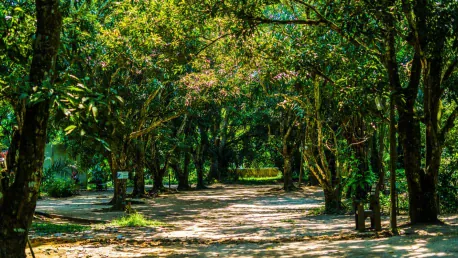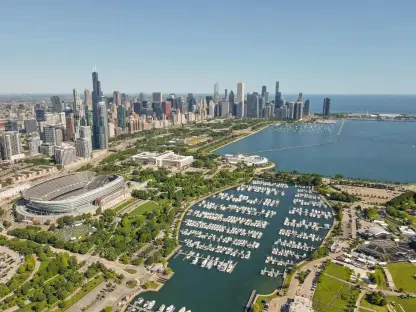The environmental initiative led by Nigerian communities in Borno State to combat the adverse effects of deforestation through sustainable tree planting is a beacon of hope. This grassroots movement, spearheaded by the Go Green Initiative, highlights the region’s efforts to tackle climate change, environmental degradation, and the socio-economic challenges resulting from deforestation.
The Genesis of the Go Green Initiative
Origins and Evolution
The Go Green Initiative was co-founded in 2012 by the Borno State government and a coalition of local groups. Initially, it aimed to address the immediate environmental concerns through tree-planting campaigns. Over time, this initiative evolved into an independent non-governmental organization, allowing it to focus exclusively on environmental management without any political affiliations. This transition has been pivotal in its success, planting approximately 2,000 trees annually, thus totaling around 22,000 over the last eleven years.
This impressive feat is the result of relentless efforts and a well-coordinated strategy designed to maximize impact and community involvement. By shedding political connections, the initiative’s independence has allowed it to build trust and stronger alliances across diverse community groups. This independence also empowers the team to focus singularly on environmental issues, ensuring consistent progression toward the goal of combating deforestation. Each tree planted represents a step toward reversing ecological damage and fostering a sustainable environment for future generations.
Community Engagement and Education
A significant aspect of the Go Green Initiative’s strategy is community engagement. By educating residents on the importance of tree planting and the detrimental effects of deforestation, the initiative garners widespread local support. This outreach extends to encouraging residents to plant fruit-bearing trees like pawpaw, guava, and orange in their yards, thus marrying environmental conservation with practical benefits. The initiative also actively engages with students in local schools, fostering an environmentally conscious younger generation that will continue these efforts in the future.
The campaigns focus on creating awareness and imparting knowledge about the ecological and socio-economic benefits of tree planting. By integrating educational programs into the school curriculum, students become more environmentally aware and learn to appreciate the significance of trees. These young advocates then take these lessons home, inspiring their families and communities to participate in the movement. By combining direct action with education, Go Green ensures that the initiative’s impact endures beyond the immediate planting activities.
The Role of Youth Advocates
Ali Yerima’s Dedication
Ali Yerima, a youth advocate and chairman of the Gomboru Youth Association, epitomizes the dedication driving these local efforts. Under the fierce midday sun, Yerima meticulously attends to the saplings he and his community have planted. His commitment stems from seven years of involvement in the Go Green Initiative, which organizes tree-planting campaigns to mitigate climate impacts in Borno State. Yerima’s approach involves planting as many trees as possible to counter the region’s heat and environmental degradation. His tireless dedication includes distributing trees within his community and beyond, helping plant over 130 trees with the aid of friends and relatives.
Through his hands-on engagement and leadership, Yerima has become a beacon of inspiration in his community. His efforts extend beyond tree planting; he actively mobilizes volunteers and gathers resources to ensure the initiative’s success. Yerima’s passion for reforestation reflects a deep understanding of the significant impact trees have on the environment. His journey, marked by unwavering dedication, exemplifies the power of grassroots movements in effecting lasting environmental change.
Inspiring the Next Generation
Yerima’s work within the Go Green Initiative also involves education. Actively engaging with students in local schools, he fosters an environmentally conscious younger generation. For example, Khadija Hussaini, a student from Borno State University, participated in a Go Green tree-planting campaign in May 2023. This experience enlightened her on the critical role that trees play in environmental conservation, prompting her and her classmates to join the initiative and commit to the care of newly planted saplings.
This approach of involving youth in conservation efforts is strategic for ensuring sustainability. By imparting knowledge and instilling a sense of responsibility, the initiative nurtures future leaders who will continue to champion environmental causes. These young advocates can influence their peers, families, and broader communities, creating a ripple effect that strengthens the movement’s reach and impact. Such educational initiatives create a holistic understanding of environmental stewardship, empowering the next generation to take proactive actions in preserving and rejuvenating their natural surroundings.
Challenges and Solutions
Overcoming Environmental and Logistical Obstacles
Despite its successes, the Go Green Initiative faces numerous challenges. Newly planted trees often face threats from grazing animals, water scarcity, and damage from passing vehicles. To overcome these obstacles, advocates within Go Green emphasize the necessity of additional governmental support to scale efforts and ensure the initiative’s sustainability. Government backing is crucial to enhance tree-planting projects, thereby amplifying their impact on combating climate change both within Borno and beyond.
The initiative has also implemented protective measures such as building barriers around saplings and setting up regular watering schedules. Volunteers play a critical role in monitoring and maintaining these young trees until they are strong enough to survive independently. Collaborations with local authorities have facilitated better protection and support for these efforts. Addressing these challenges requires a combination of strategic planning, resource allocation, and persistent community involvement, ensuring that the trees can thrive and contribute positively to the environment.
Addressing Economic Pressures
The impact of deforestation in Borno State is multifaceted, leading to severe environmental degradation, loss of biodiversity, soil erosion, and shifts in local climate patterns. A significant driver of deforestation is the lack of awareness among individuals who cut down trees for firewood due to economic pressures and conflicts. Providing alternative energy solutions like affordable gas and kerosene is crucial to curb the reliance on firewood, thereby reducing deforestation rates. By offering these alternatives, the initiative can address economic challenges while promoting environmental sustainability.
Promoting the adoption of cleaner energy sources not only helps protect forests but also improves health by reducing smoke pollution. The Go Green Initiative has been advocating for governmental and non-governmental organizations to invest in these energy solutions, thereby making them more accessible and affordable to the local population. This holistic approach involves addressing the root causes of deforestation and providing viable alternatives that meet the community’s needs without harming the environment. By tackling economic pressures head-on, the initiative paves the way for more sustainable living practices within Borno State.
Collaborative Efforts and Partnerships
Local and International Collaborations
The Go Green Initiative collaborates with various organizations both locally and internationally. Partners include the United Nations Population Fund (UNFPA), Mercy Corp, Dark Green Leaves Initiative, and UNICEF. These partnerships are pivotal in providing a steady supply of trees and enabling the initiative to expand its reach. Collaborative efforts enhance the initiative’s capacity to address the environmental challenges in Borno State effectively.
These partnerships bring in resources, expertise, and visibility, which are crucial for the continued success and expansion of the initiative. By joining forces with established organizations, Go Green can leverage broader networks to source seedlings, technical support, and funding. Furthermore, international collaborations provide platforms for sharing best practices and innovative solutions that can be adapted locally. Such synergies amplify the impact of the initiative, ensuring sustained and scalable reforestation efforts across Borno State and potentially beyond its borders.
Government and Community Support
Advocates within the Go Green Initiative, like Ibrahim Babagana, emphasize the importance of government backing to enhance tree-planting projects. Government support is essential to scale efforts and ensure the initiative’s sustainability. Additionally, continuous public awareness campaigns are necessary to educate the populace about the negative effects of tree cutting and the importance of reforestation. Collective action from community members and the broader public is crucial in these efforts.
Government involvement can provide vital infrastructure, policies, and enforcement that protect reforestation efforts from setbacks. By integrating tree planting into national and local development plans, authorities can create a supportive environment for initiatives like Go Green to thrive. Educational campaigns, both in media and community gatherings, help instill a conservation mindset among citizens. This collaborative approach ensures that environmental stewardship becomes a shared responsibility, enabling more resilient and cohesive efforts to protect and rejuvenate Borno State’s natural environment.
The Broader Impact of Deforestation
Environmental and Socio-Economic Consequences
The consequences of deforestation in Borno State are dire, contributing to extreme weather conditions, the death of fresh trees, increased flooding, rising disease rates, and the drying up of Lake Chad shores. These issues hinder fishing and farming activities, escalate farmer-herder conflicts, and advance desertification. The smoke from wood-burning further exacerbates environmental and health issues, leading to ecosystem degradation.
These widespread impacts highlight the critical need for comprehensive and sustained reforestation efforts. The degradation of ecosystems affects not just the environment but also the socio-economic fabric of the communities. Reduced agricultural productivity and loss of livelihoods drive communities into poverty, creating a vicious cycle of resource depletion. Addressing deforestation thus requires holistic strategies encompassing environmental, economic, and social dimensions. The Go Green Initiative’s multifaceted approach offers a blueprint for tackling these interconnected challenges.
The Need for Continuous Advocacy
The environmental initiative led by communities in Borno State, Nigeria, to combat the negative impacts of deforestation through sustainable tree planting serves as a beacon of hope for the region. This grassroots movement, championed by the Go Green Initiative, underscores the local efforts to address not only climate change but also environmental degradation and the socio-economic issues caused by deforestation. The Go Green Initiative has mobilized citizens, involving them in various activities such as tree planting, education on the importance of forests, and strategies for sustainable land use. This initiative aims to restore ecological balance, enhance biodiversity, and provide economic benefits to the local population through improved agricultural productivity and sources of income. By reforesting the area, the initiative also works towards long-term solutions for mitigating the impacts of climate change, ensuring that the environment and the community can sustainably thrive. Through community collaboration and dedication, the region is on a path to a greener and more sustainable future.









